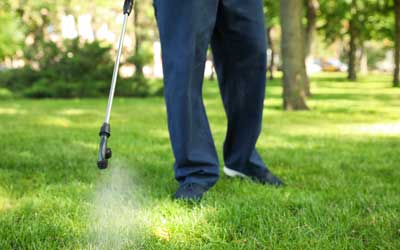Comprehensive Pest Control Clovis Solutions for each Need
Wiki Article
Understanding the Various Strategies to Pest Control: A Comprehensive Overview

All-natural Insect Control Methods
Utilizing eco-friendly methods such as friend growing and biological pest control is necessary for effectively managing bugs in agricultural settings. Friend planting involves expanding various plants in proximity to discourage parasites, improve nutrient uptake, and improve overall crop wellness.Organic parasite control includes introducing all-natural killers or pathogens to manage pest populations. Ladybugs, as an example, feed upon aphids, managing their numbers without the need for chemical pesticides. Another instance is the use of Bacillus thuringiensis (Bt), a microorganism that targets certain insect pests while being safe to people, pets, and helpful pests.
These environmentally friendly approaches not just reduce the dependence on artificial pesticides yet also help maintain biodiversity and soil health and wellness. By integrating natural pest control methods right into agricultural methods, farmers can accomplish lasting pest monitoring while lessening adverse influence on the atmosphere.

Chemical Insect Control Solutions
Along with all-natural parasite control methods, the utilization of chemical pest control solutions plays a substantial duty in properly taking care of pest populaces in farming atmospheres. Chemical parasite control options are created to target certain pests that may cause substantial damage to crops. These services typically consist of artificial pesticides that are designed to eliminate insects rapidly and efficiently.Among the vital benefits of chemical pest control solutions is their effectiveness in controlling insect problems on a big scale. Farmers can use these solutions using numerous methods such as spraying, fumigation, or seed treatment to protect their crops from dangerous pests, weeds, and diseases. In addition, chemical pest control services are fairly simple to apply and can supply fast outcomes, assisting farmers secure their yields and reduce financial losses.
Nevertheless, it is vital to use chemical parasite control solutions carefully to decrease possible negative influence on the environment, non-target organisms, and human health and wellness. Appropriate application methods, adherence to safety standards, and normal tracking are critical to ensure the liable use of chemical bug control remedies in farming practices.
Organic Insect Control Approaches
Biological parasite control comes close to utilize natural predators or pathogens to take care of bug populations in agricultural setups successfully. This technique provides a environmentally friendly and sustainable service to pest monitoring, lowering the dependence on synthetic chemicals and decreasing injury to the setting. One typical organic control method is the intro of all-natural enemies, such as ladybugs or parasitical wasps, to target specific bugs. These killers feed on the bugs, assisting to regulate their populaces normally - pest control clovis.One more organic control approach entails using pathogens like fungi, microorganisms, or infections to infect and eliminate bugs. Overall, organic insect control strategies provide a lasting and targeted solution to pest management in agriculture.
Integrated Pest Monitoring (IPM)
Integrated Insect Administration (IPM) is a comprehensive method that combines different insect control methods to efficiently manage and lessen pest populaces in agricultural systems. IPM concentrates on long-lasting avoidance of pests via a mix of organic, social, physical, and chemical control techniques. By incorporating these various methods, IPM intends to reduce dependence on chemical pesticides, reduce environmental effect, and advertise lasting pest administration practices.
One trick element of IPM is making use of biological controls such as natural predators, parasites, and pathogens to regulate insect populations. This approach harnesses the power of nature to preserve a balance in between parasites and their natural enemies without causing harm to the atmosphere.
In addition, IPM entails social practices like crop turning, hygiene, and environment control to create unfavorable problems for insects and interrupt their life cycles. Physical controls such as composts, catches, and obstacles are additionally utilized to avoid parasite problems.
Mechanical and Physical Bug Control Techniques
Using non-chemical methods, such as mechanical and physical parasite control methods, is a crucial element of extensive bug monitoring methods, building upon the foundation of Integrated Insect Administration's holistic strategy. Mechanical bug control involves using physical obstacles or traps to stop insects from accessing and damaging crops or structures. This approach can include techniques like mounting displays on home windows, using row covers in farming, or employing sticky catches to capture bugs.Physical insect control techniques, content on the various other hand, emphasis on straight removing insects with physical methods. Utilizing heat treatments to eliminate bed pests or vacuuming up insects like ants or crawlers can be reliable ways to manage why not check here problems without the usage of chemicals. By incorporating these mechanical and physical pest control methods right into an Integrated Insect Management strategy, experts and individuals can decrease reliance on chemicals while still properly managing pest populations and lessening damage.
Final Thought

In addition to natural parasite control methods, the usage of chemical bug control options plays a considerable function in effectively taking care of pest populaces in agricultural settings.One of the key advantages of chemical bug control options is their efficiency in regulating insect infestations on a huge scale.Integrated Parasite Administration (IPM) is navigate to these guys a detailed strategy that incorporates numerous parasite control approaches to properly handle and reduce pest populations in farming systems.Using non-chemical methods, such as mechanical and physical bug control strategies, is a vital element of comprehensive bug administration methods, constructing upon the structure of Integrated Parasite Management's alternative technique. By including these mechanical and physical bug control techniques right into an Integrated Parasite Management plan, people and specialists can minimize dependence on chemicals while still efficiently minimizing and handling pest populaces damages.
Report this wiki page